If you’re here, I imagine you’re searching for coffee alternatives for GERD (Gastroesophageal Reflux Disease) because you’ve had enough of the following reflux spiral: you’ve sat down for your first cup of steaming coffee for the day—either at home with your brekkie, rushing around trying to find order in chaos whilst you gulp it down, or maybe you’ve decided to sit, sip and contemplate whilst you prepare for the day.
Some minutes pass. You’re either in your car or getting through the first task of the day—whatever you may be doing, you start to get a burning feeling in your gut and might even get an odd taste of stomachy acid in your mouth. Uch.
Discomfort sets in, and you’re suddenly thinking where you left your acid reflux remedies—were they in that bag I left at home or in the medication drawer? Are there any left? Gah, I may have to go to the store on my lunch break or just ride it out. Relief is on your mind but out of grasp—for now.
Coffee is a joy for so much of the world, as it is for me. It becomes a familiar companion not just in the morning but throughout the day. For some of us, it’s everything from the earthy, bitter-sweet taste to the habitual ritual that’d feel wrong to let go of. Sometimes, it’s just the necessity that gets us up and going and keeps our brain cogs turning. So, it can ruin the party when our gut just doesn’t seem to cooperate with all our good will and intent.
I know how it feels. My acid reflux used to come with bloating after having coffee. It wasn’t a swift realisation, but I put two and two together after I had a takeaway coffee at work and my stomach began bloating, hurting, and (TMI) my increasing burps tasted like sourness.
This sometimes lasted for hours, and I’d be gripping my tum and feeling sorry for myself—wondering why I thought this time would be any different.
All is not lost though.
Whether you want the caffeine kick or the coffee taste, you don’t have to abandon your cuppa. If you don’t mind sacrificing one for the other, this opens up even more options.
Eventually—probably like you now—I got tired of trying to relieve my symptoms. I buckled down, figured out why this was happening, and decided to put myself out of the misery by trying something different.

Why Coffee Triggers Acid Reflux (GERD)
Woes aside, I dug into why some of our bodies can react like this. While the jury is still out around definitive evidence that coffee or caffeine directly aggravates GERD or gastrointestinal symptoms, it is thought that coffee and caffeine can increase acid production in our stomach and relax the lower esophageal sphincter (a mouthful, but basically a muscle at the bottom of your throat pipe).
This relaxing means it becomes easier for acid to travel up your esophagus and cause that burny feeling in your chest—and sometimes even up to your throat.
Sometimes though, it’s not as simple as coffee = more stomach acid (sorry). Everybody is different. Whilst there are alternatives we can try, there is no quick fix to knowing your body and what it can tolerate. You may find—through bringing awareness to how you and your body feel after different types of coffee or coffee alternatives—that the culprit could be more so caffeine than coffee itself, or vice versa.
Caffeine content can depend on the size of your cup, how many espresso shots are mixed into your takeaway coffee, or the type of roast. Coffee labelled as dark roast will normally contain less caffeine but can be more acidic, which just goes to show the importance of tuning in to how your body reacts to different types.
The bottom line is that many lifestyle factors can contribute to the aggravation of GERD. This can span beyond coffee to include smoking, fatty foods, eating patterns, certain medications and other drinks. If you’re drinking tea or soda/fizzy drinks, keep a mental note that these can also contain caffeine.
I would say keep a diary—that is what my doctor recommended for tracking my GERD/acid reflux symptoms—but I know more than anyone how hard it can be to be consistent with that. And who wants more things on their to-do list? (I can firmly say, I do not).
If I’m going to get any takeaway, it’s not from a coffee shop but from this: find space, even if it’s just a moment, to ground and notice how you’re feeling after different types of coffee (maybe even tea or caffeinated drinks). A simple start to an end of gurgling stomach suffering.
You could save more time, effort and money in the long run if you can get to the root of why coffee just won’t play ball with your gut—by just taking a few seconds to check in with yourself after a cup of coffee. BUT…
Don’t want to experiment with different types of coffee and caffeine content? I don’t blame you. Sounds like more potential pain and, importantly, more time (which feels scarce nowadays…). If you’re fed up and just want to enjoy a cuppa, then skip that step and read on to explore coffee alternatives for GERD, including what helped me.
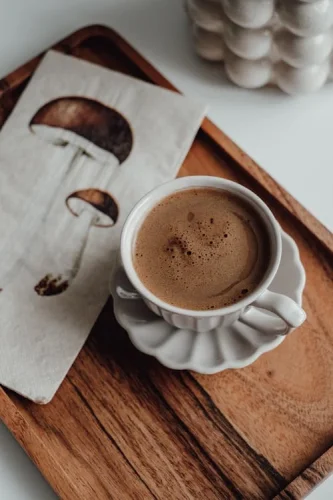
Mushroom Coffee Alternatives for GERD
I know it sounds weird, m’kay. It inspires both puzzlement and curiosity. But don’t turn away just yet — because it does not taste like mushrooms.
You might be wondering: what actually leads someone to mushroom coffee?
I go into more detail about my own experience in this blog post, where I explain how caffeine was also triggering emotional overwhelm — which led me on a search for something kinder to my mind, brain, and body. In that post, I vouch for my favourite mushroom coffee brand. You can grab it through this link, which, to me, tastes like a warm hug — think: mocha vibes. I also run through a brief cost-benefit comparison of popular brands you can order right to your door.
If you are a GERD sufferer, you might know there’s a connection between gut issues and stress/anxiety.
Mushroom coffee is usually low in caffeine, so there’s a lower chance that mushroom coffee will trigger anxiety or jitters and acid reflux.
Also, mushroom coffee is generally less acidic. So, your GERD is less likely to be aggravated, especially if you go for brands that are also lower in caffeine, like the ones I mention here.
And the triple bonus? Mushroom coffee often contains adaptogens — natural substances that help your body adapt to stress, both mental and physical.
If I were to vouch for one gut-friendly option above all, I’d say go for a blend that includes chaga mushrooms, which are known for helping reduce gut inflammation and damage.
(As always, check with a healthcare professional if you have GERD or other significant digestive concerns before trying new supplements).
One standout option is Spacegoods Rainbow Dust (funky brand name or what?). Their super-potent blend includes chaga, plus other good-for-you mushrooms. You can grab the full pack here, or if you just want to give it a try first, they also offer a 7-sachet taster here.
Heads-up: Rainbow Dust contains 120mg of caffeine, which is on the higher side for mushroom coffee (standard coffee usually ranges from 80–150mg). So, if caffeine is your main sensitivity, you may want to try something gentler.
If you’d prefer a caffeine-free option that still contains chaga (for gut health), cacao (hello, hot chocolate!), and anti-inflammatory ingredients, Soulbrew might be your new go-to.
For a more budget-friendly option, Brayn offers a mushroom coffee blend that includes Turkey Tail (don’t worry, it’s a mushroom – not poultry). It is great for gut health thanks to its high prebiotic content.
This post contains affiliate links. If you purchase something through these links, I may earn a small commission at no extra cost to you. I only recommend products I genuinely use and love. Thank you for supporting Grownded.
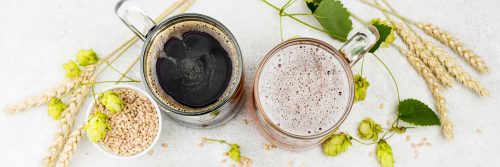
Chicory Root: A GERD-Friendly Coffee Alternative
This is a comforting option with a rich, deep flavour. Pretty close to coffee, I’d say, but without any caffeine at all. That can be a huge win if caffeine is the main reason your GERD flares up.
The main benefits? It’s:
- Low-acid
- Caffeine-free
- Prebiotic-rich
- You can brew it like coffee
What more could you want?
My top pick is Chikko Not Coffee. I really appreciate when things aren’t overloaded with unnecessary chemicals. This one hits that mark — it’s free from additives and keeps things simple.
I also get that not everyone wants to blow their wages on coffee alternatives.
If you want a solid, everyday pick that won’t hurt your wallet, I recommend Clipper’s Organic No-Caf.
It’s a chicory and barley blend, and the price is similar to what you’d pay for a regular jar of coffee at the supermarket.
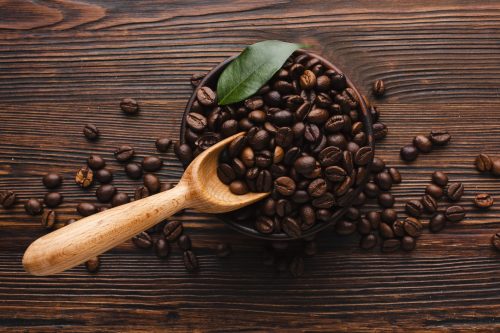
Decaf Coffee as a Low-Acid Coffee Alternatives for GERD
Now, I know what you’re thinking. Decaf? It’s not quite the same—and you’re right.
But if your main issue is caffeine or you’re just not ready to say goodbye to the comforting flavour of coffee, these options could be the perfect coffee alternatives for GERD and acid reflux.
That said, not all decaf is made equal.
If you’re looking for something gentler on the gut, opt for beans that are Swiss Water Processed—this method uses water instead of chemicals to remove caffeine and tends to be easier on digestion.
You’ll also want to keep an eye out for low-acid blends, which help reduce the burny backlash some of us get.
A couple of solid picks are:
- Meletius Latin America Decaf (https://amzn.to/4mSi7qk) – High quality, ethically sourced and smooth flavour – without the chemical nasties due to water processing.
- Fuss-free, water processed decaf coffee bags from Moreish (https://amzn.to/4mQfO79)
This way, you’re still getting the experience of coffee but without the parts that make your gut throw a tantrum.
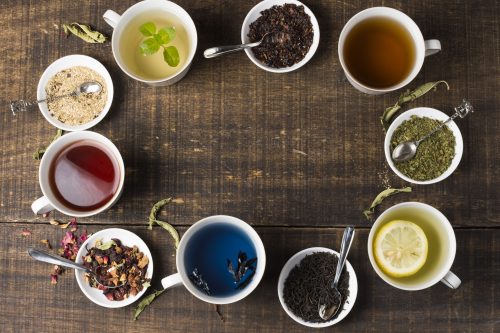
Herbal Teas that Work for GERD
If you’re ready to ditch caffeine entirely but still want a warm, grounding drink in the morning (or afternoon, or any time really), herbal teas are my go-to.
Herbal teas are not only a staple in my morning and nighttime ritual, but also keep me hydrated since I tend to struggle to drink water consistently throughout the day.
Some of my top picks for a sensitive stomach are:
- Licorice root tea – a go-to for GERD sufferers thanks to its soothing properties.
- Chamomile – calming for the gut and the mind (and often a bedtime ritual for me).
- Ginger tea – warming and anti-inflammatory effects are enhanced with added turmeric.
- Rooibos – naturally caffeine-free, organic and packed with antioxidants.
A small heads-up: as much as I love peppermint for bloating, it’s best avoided if you have reflux. It can relax the esophageal sphincter and actually make GERD worse. So maybe keep that one for non-reflux days.
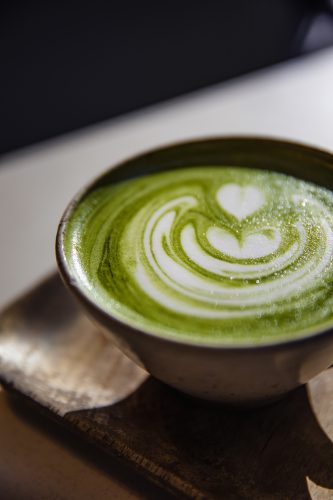
Matcha and Black Tea (Lower-Caffeine Options)
If you’re not quite ready to go fully caffeine-free, matcha and black tea can be a softer landing. They have less caffeine than coffee but still give that gentle lift without the full-blown jitters or stomach acid spike.
Matcha, in particular, is a favourite for me when I want sustained energy and a focused kind of calm.
It contains L-theanine, which promotes relaxation and helps buffer the effects of caffeine.
Plus, it’s rich in antioxidants and has a naturally earthy taste (kind of like coffee but greener and gentler).
My absolute go-to (I’m sure I’ll write a whole blog post on this one) is Matcha Fuel which you can get through this link. It is naturally sweet, doesn’t have that grassy / seaweed taste, and is full of adaptogens and mushrooms.
Black tea, on the other hand, has roughly half the caffeine of coffee. As coffee alternatives for GERD go, this is still a bit acidic, so depending on your sensitivity, this might be a hit or miss – but worth a try as a stepping stone if you’re not quite ready to go herbal.
While you can get this in most stores, if you’d like organic tea and chemical-free tea bags, I’d recommend Clippers fair trade black tea here.

Redefining Your Morning Ritual
If you’re still here, you can see there are plenty of coffee alternatives for GERD that still let you enjoy your morning ritual without discomfort.
You can simply redefine a habit in a way that feels better in your body and let’s you be more ‘here’ for life.
Whether it’s a spoonful of chicory in warm oat milk or a grounding cup of mushroom coffee with a dusting of cacao, it’s all about experimenting and finding what supports you – your gut, your energy, your peace of mind.
Remember: what works for one person might not work for another – and that’s okay. Keep tuning in, noticing, adjusting.
Use that moment in your day when you take a sip of your coffee alternative to check in with yourself and be present for the day through all the noise.
Got a go-to alternative you swear by? Or still figuring it out? I’d love to hear – drop me a message or leave a comment below
This post contains affiliate links. If you purchase something through these links, I may earn a small commission at no extra cost to you. I only recommend products I genuinely use and love. Thank you for supporting Grownded.
